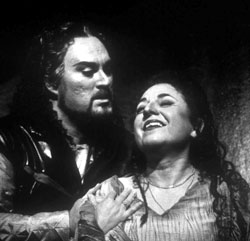This is the only opera I can think of in which the tenor dumps the soprano for the alto. Bellini’s 1831 Norma (which the Seattle Opera performs through Saturday, March 8) subverts love-triangle convention in other ways as well: Do the soprano and altoNorma, a Druid high priestess, and Adalgisa, one of her novicesbecome mortal enemies? Noboth outraged at their lover’s caddishness, they sing a sisterly duet of mutual devotion. You go, girls!
It’s Gaul during the Roman occupation, and the tenor, Pollione, is the Roman in charge. The Druids of Gaul want to revolt and impatiently await Norma’s say-so, but she’s torn between expelling the invaders and protecting the father of her children.
On this plot, Bellini constructed the quintessential example of 19th-century bel canto vocal style: acrobatic ornaments decorating and intensifying long, long phrases (Bellini’s way with an endless tune influenced Chopin, above all his contemporaries). Only the utmost flexibility, control, stamina, and purity of tone will do. On top of all that, the role of Norma evokes near-impossible emotional extremesat various points in the opera, Norma loves and hates her children, loves and hates Pollione, loves and hates Adalgisa. Warrior, mother, religious leader, spurned loverit’s an intimidating role, which few sopranos dare take on.

The Gold Cast: Goerke (left) as Norma |
Norma’s opening prayer, “Casta Diva” (“Chaste Goddess”), is a touchstone of the bel canto soprano repertory. It’s not a complicated aria to singit requires only flawlessness. The Gold Cast’s Christine Goerke, singing her first Norma anywhere in the Seattle Opera production that opened last Saturday, sounded impressive, if just a shade hesitant and careful. She turned up the emotional heat a bit higher in each act. Sally Wolf, the Norma in Sunday’s Silver Cast and a veteran of the role, cast the more enchanting spellshe had a sort of imperious ice-queen thing going throughout. Both approaches worked.
Saturday’s Pollione, Antonio Nagore, offered a virile warmth that rang to the furthest corners of the house. Philip Webb, the Silver Cast’s Pollione, sang with less sheer carrying power, but with a lighter, silkier tone. So attractive are both these tenors’ voices that you almost forget that the two-timing, dictatorial Pollione is one of the biggest jerks in all tenordom.
The singer who really makes you sit up is Ewa Podles, the Gold Cast’s Adalgisa. She has the kind of delivery that leaps over the pit and grabs youevery phrase and every note was impassioned, though nothing felt self-conscious or overplayed. Her voice offered a range of startling color: At the top, it has almost the same clarion brilliance as Goerke’s; at the bottom, there’s a mysterious and otherworldly hint of countertenor. Yet one big advantage to the Silver Cast is its Adalgisa, Phyllis Pancella, who looked, acted, and sounded younger than Wolf’s Normamore convincingly troubled, more in need of guidance.
Curtis Wallin’s set was dominated by gnarled tree trunks with clawlike roots that hung like stalactites from the ceilingforeboding but not distracting. The same was true for Anna Bj�dotter’s earthy costumes and Edoardo Mller’s headlong but elegant conducting. Each element of this production contributed to the drama without (I imagine) getting in the way for those bel canto fans who look to Norma primarily for a display of vocal prowess.







